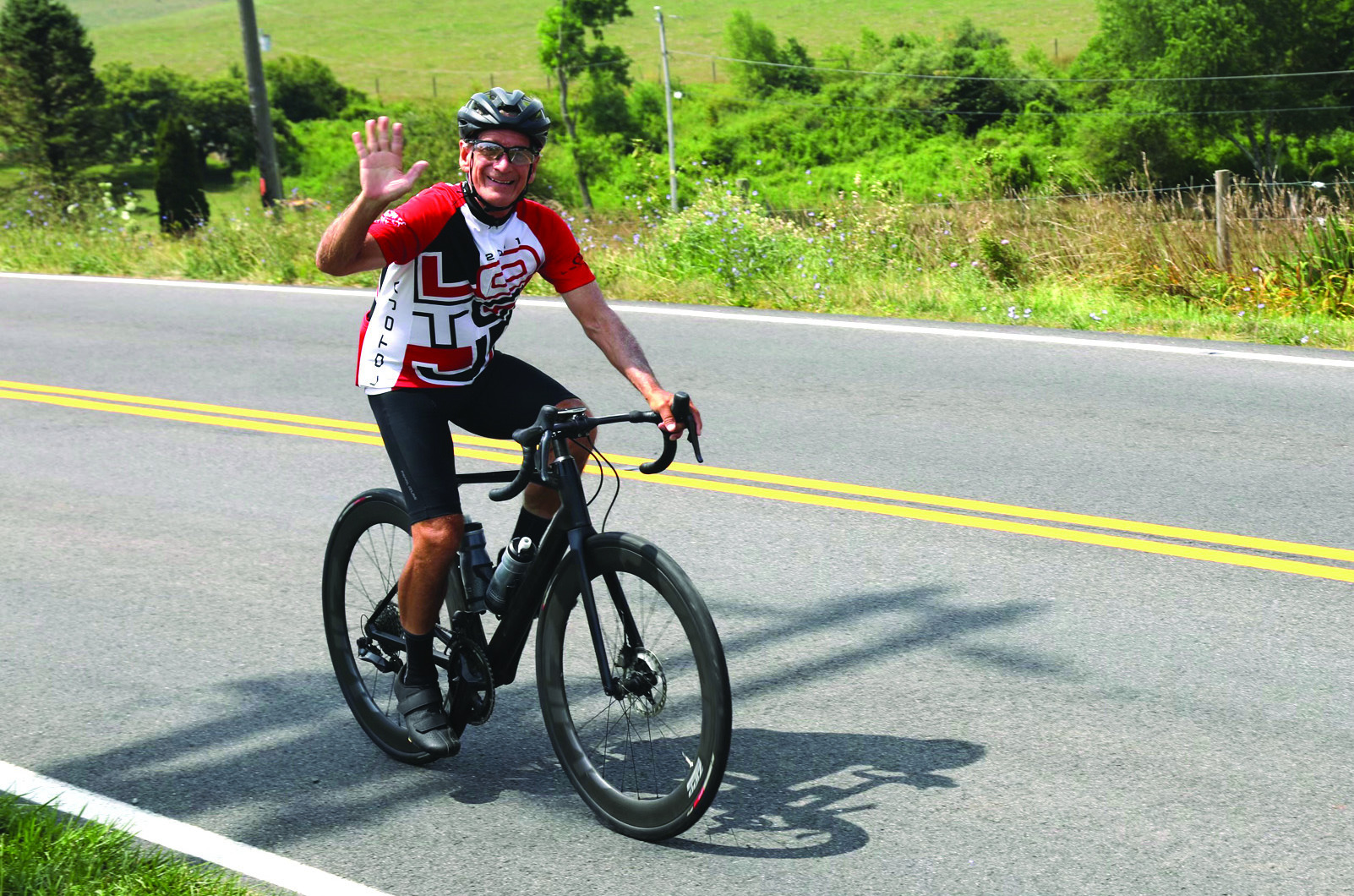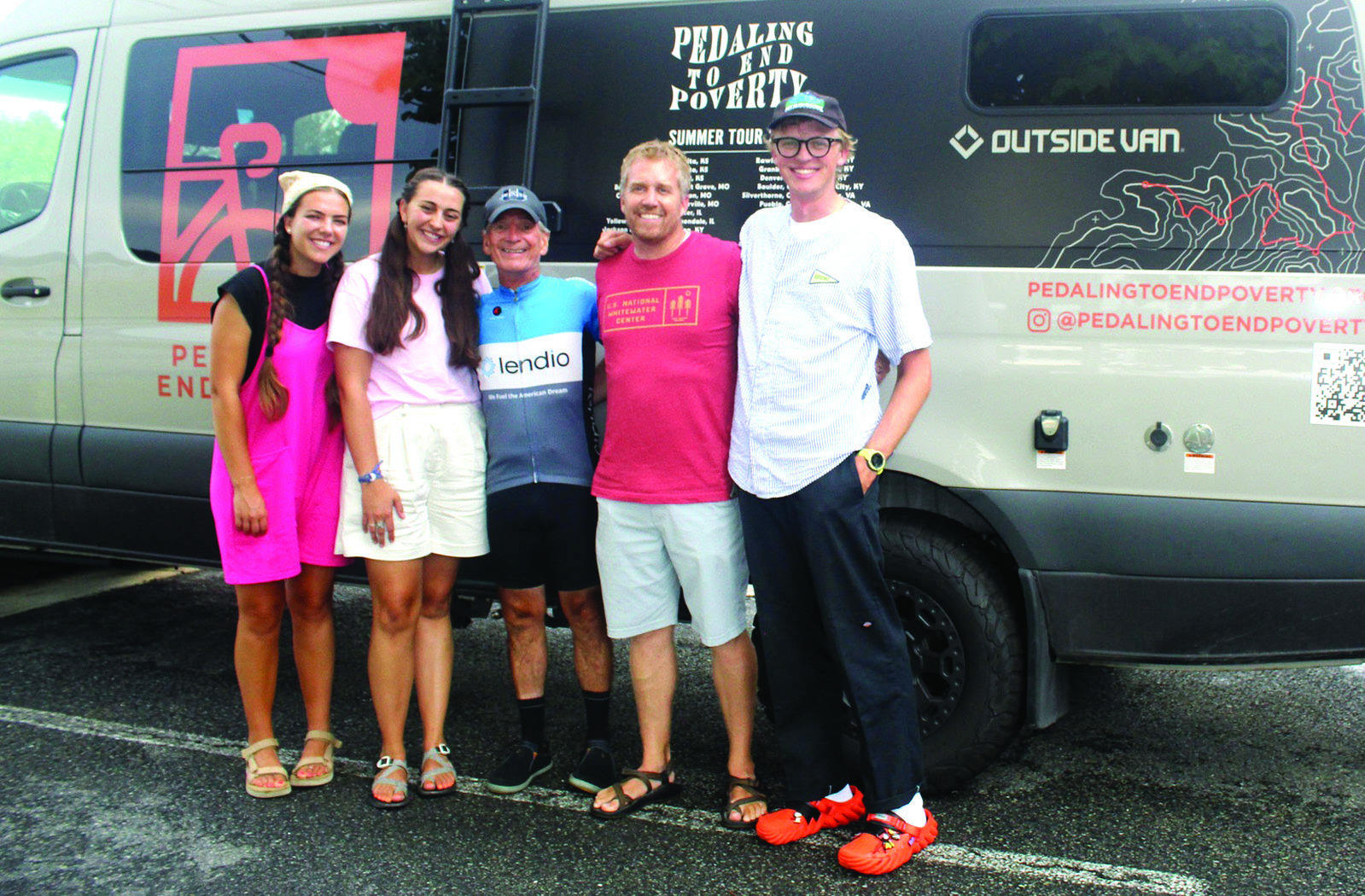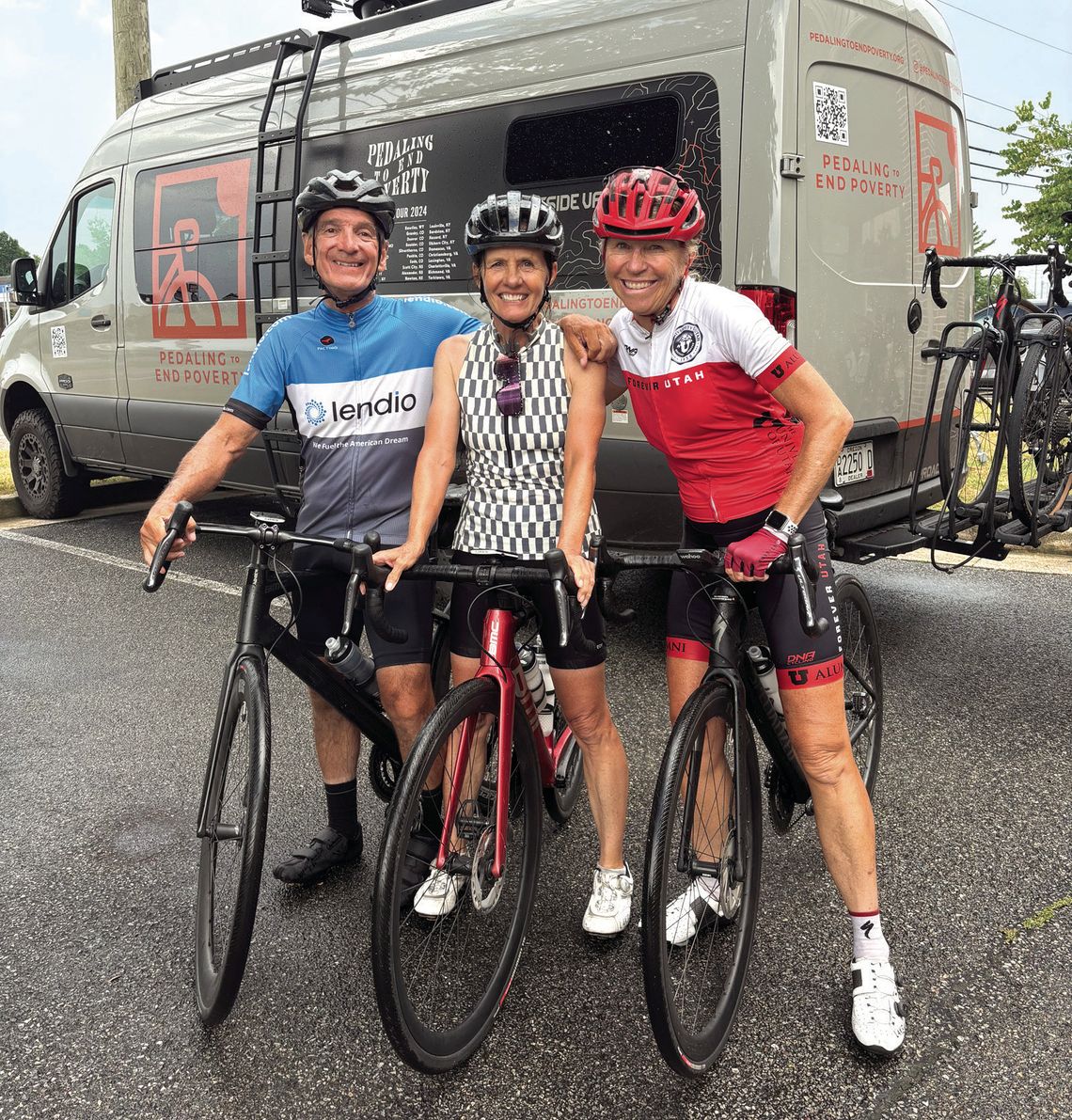Utah State Professor Leads Bicyclists On Coast-To-Coast Ride
Riding in the pouring rain of western Virginia, 70-year-old Utah State University professor Mike Glauser and his team of bicyclists arrived in Lexington on the afternoon of July 17. Before long, the rain let up, and the sun came out.
It was the 45th day of a 48day journey across the United States, following the Trans-America Trail, with the bicyclists riding nearly 4,000 miles from Florence, Oregon to Yorktown.
The ride from the Pacific Coast to the Atlantic Coast was called Pedaling to End Poverty, a journey of teamwork and a capstone for Glauser’s entrepreneurship students. Glauser is the executive director of the Center for Entrepreneurship, Huntsman School of Business at Utah State University. His students have taught more than 10,000 people in Ghana, Cambodia, the Dominican Republic, Paraguay, the Philippines, Peru and other countries how to start and grow successful businesses, transforming their lives and the lives of their families, employees and those in their communities. This year, Glauser has traveled to the Philippines, Cambodia and Peru, and he’ll be in the Dominican Republic and probably Africa in the fall, teaming up with students to help impoverished people.
Accompanying Glauser were his wife of 45 years, Mary, four of his colleagues, his interns, and his documentary film crew.
Glauser did media interviews across the country and met people in small towns and cities along the way, and many folks he encountered donated to this cause. The journey went through Oregon, Idaho, Montana, Wyoming, Colorado, Kansas, Missouri, Illinois, Kentucky and Virginia, with the bicyclists riding about 500 miles a week, mostly on rural roads.
After riding his BMC bicycle to the Country Inn & Suites by Radisson on U.S. 11 in Lexington on July 17, Glauser sat in a chair outside of the hotel and talked about the impact this journey has had on his students. “It opens their eyes, and then it changes the lives of the people they teach,” he said. “It’s been so successful, it actually works. … So we want to expand it and include more students. So we thought if we ride across the country and do media interviews – all the way across from the Pacific Ocean to the Atlantic Ocean, radio, TV, print, podcasts – and we’re saying, hey, donate a couple pennies per mile.”
Glauser noted that a penny per mile is about $40. When the team stopped in Lexington, with money donated and commented, Pedaling to End Poverty had raised about $500,000. “If we can get $600,000, we can send 100 students out every year for three full years,” said Glauser. “That’s the goal, and we’re getting close.”
One of the keys to keeping the Pedaling to End Poverty team on its planned schedule was the assistance of two vans, which Glauser called the team’s “command center,” meeting the bicyclists about every 20 miles and providing essential items. “We’re drinking two or three full bottles almost every hour when it gets hot in the afternoon,” said Glauser. “We consume a lot of electrolyte fluids and bars and gels, and we usually stop in the middle of the ride, about 50 miles in, and have a small, quick lunch.”
Glauser brought three student interns on the journey: Page Longhurst, Nicole Sperry and Kyler Gunnell, one of their videographers. The head videographer is Andy Thunell, the program coordinator for the Center for Entrepreneurship at Utah State.
In addition to the two videographers, the team also has two social media content producers. “They’re posting kind of behind-the-scenes videos of the people we meet,” said Glauser. “We have a lot of footage of the people we’ve helped around the world, and we have a lot of footage of the students, and we want to weave the bike trip through that story to make it a little more interesting.”
Glauser, who is originally from Salt Lake City, has taught at Utah State for the past 13 years. After getting his undergraduate and master’s degrees from the University of Utah, Glauser earned his Ph.D. from Purdue University in Indiana, then began his professional career teaching business at universities. He left academia to work in business for about 20 years, working for startup sales companies. He eventually got back into teaching.
This isn’t the first year Glauser has done this journey. Ten years ago, when he was 60, he biked across the country with the Pedaling to End Poverty team, and they interviewed 100 entrepreneurs across the country who “moved to a place they wanted to live and picked a lifestyle, and then they built businesses so they could stay there,” said Glauser.
“We loved that experience, so we’re doing it again, this time featuring our capstone entrepreneurship training program for our students,” added Glauser.
In 2016, two years after that ride, Glauser wrote a book called “Main Street Entrepreneur: Build Your Dream Company By Doing What You Love Where You Live.”
The students this year did their capstone through a program called Small Enterprise Education And Development (SEED).
“In the Center of Entrepreneurship, we have many programs for students to learn entrepreneurial leadership skills,” explained Glauser. “So what we do is we recruit 100 students every year from a variety of majors. We train them. We put them through an intensive one-semester training program in the skills of entrepreneurship, and they learn how to teach those to classes, and, more importantly, learn how to manage the people that are actually starting businesses. The next semester, after they complete that course and are qualified to go, we send them out into the world, and they actually live close to people that are in extreme poverty, and they teach them. They might teach in classroom settings of 100-120 people during those three months, and then they pick 12 or 15 of those that are actually really starting a business, and they mentor them through that with startup classes. The goal is, we want to double or triple household income as soon as we can because it really takes them out of that extreme poverty class and puts them in kind of a lower middle class. Their kids can go back to school. They can build a small cinder block house.”
At their stops, Glauser said he and his team members are often asked what their favorite city is. “The real honest answer is, every state’s different,” he said. “We’ve loved all of them. The Rocky Mountains are great. We really liked Kansas, meeting all those friendly people, flatter rides.” He said they also enjoyed the Ozark Mountains of Missouri. In Virginia, he said, “Every day, it’s spectacular for us, coming from the desert.”
There weren’t any major problems along the way. Glauser said he only had one flat tire, and one of the group’s guests had a flat tie. “We’ve been fortunate,” said Glauser. “No accident, no falls.”
They also didn’t have problems with wildlife, taking rural roads and seeing a lot of dogs.
The major challenge, Glauser said, was weather. “We’ve been rained on only probably three or four times, but we had excessive heat in Kansas -- 100, 103 degrees,” he said. “The heat and humidity here is not bad. It’s been about 85, 90 degrees. It’s beautiful. We love riding rural backroads. We’ve got these canopies of trees we’re riding through. They’re cool.” He said he and his team also like the rolling hills of Virginia.
Glauser, who ran marathons and half marathons before switching to the lowerimpact exercise of bicycling, emphasized the importance of staying in shape. “I’m kind of testing a theory that 70 can be the new 50 if you take care of your body, proper nutrition and proper training,” he said. “I trained for five months for this event. And then, as you go along, you get stronger. The first couple weeks are hard because you’re suddenly riding 500 miles a week, but by the fourth week, you feel like you can pretty much handle anything. It’s still hard, but you can handle it. You get used to it.”
Comparing the experience this year to 10 years ago, Glauser said, “It’s very doable for me. I don’t have quite the power … I don’t recover quite as fast. But it’s not too much different.”
The father of five, Glauser said, “That’s not a big part of what we’re doing, but I want my kids and students to know that you can be active and keep doing fun things, and you can take care of your body. You can eat right, and you can exercise right. You don’t need to start laying on a couch at 60 years old.”
Glauser said that the reactions of people he and his Pedaling to End Poverty team have met along the way have mostly been positive. “We talk to everyone we meet,” he said. “We have two vans, so we’re hard to miss. We pull into a small town, and we’re immediately surrounded and having conversations about who we are, what we’re doing, why we’re crazy enough to ride our bikes across the country. And we’ve met some fabulous people, really friendly, helpful. They’re all interested in helping. Some of them have said, ‘We want to donate.’ And they have.”
For more information on Pedaling to End Poverty and to donate, visit www. pedalingtoendpoverty.org.


.jpg)



